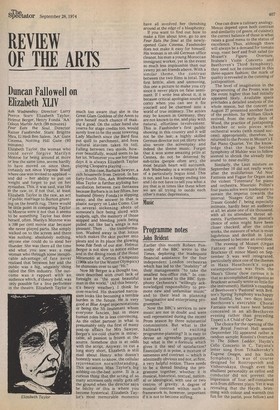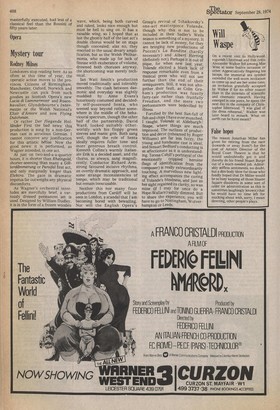Programme notes
John Bridcut
,Earlier this month Robert Ponsonby of the BBC wrote to the Times, deploring the inadequate financial assistance for the four independent London orchestras which has led to the "inability" of their managements "to take the smallest box-office risk." In contrast he pointed to the BBC Symphony Orchestra's "willingly acknowledged responsibility to promote new and unfamiliar music" and to their lead in planning "imaginative and enterprising programmes."
Now the BBC's services to new music are not in doubt and were well represented during the recent Prom season by three substantial commissions. But what is the hallmark of exciting programme-planning? It is easy to devise an agreeable programme, but what is the x-formula which gives it the seal of satisfaction? Essentially it is poise, a mixture of sameness and contrast — which is admittedly obvious and not, at first, a very helpful notion. There needs to be a thread binding the programme together, whether it is musical, historical, textual, national or ideological, with one or two centres of gravity. A degree of musical contrast within such a framework is, however, important if it is not to become stifling. One can draw a culinary analogy. Menus depend upon both contrast and similarity (of genre, of cuisine); the correct balance of these is what raises a good menu to the status of excellence. Thus, although there will always be a demand for tomato soup, roast beef and fruit salad (or Mozart's Figaro Overture, Brahms's Violin Concerto and Beethoven's Third Symphony), they need not be consumed in this three-square fashion; the mark of quality is revealed in the cunning of juxtaposition. The level of imagination in the programming of the Proms was in the event higher than had initially appeared likely. Available space precludes a detailed analysis of the whole season, but the concert on August 27 presented another facet of the problem. Sir William Glock revived, from the early days of Wood, the practice of juxtaposing chamber or solo pieces with orchestral works (with mixed success); appropriately, therefore, he returned to the Proms in Mozart's E flat Piano Quartet. Yet the knowledge that the huge Second Symphony of Mahler was to follow seemed to shrink the already tiny sound to near-nullity.
Similarly, the Liszt mixture on September 10 did not really work: after the multifarious 'Ad Nos' Fantasia and Fugue for Organ and the violent 'Totentanz' for piano and orchestra, Maurizio Pollini's four piano solos were inadequate to sustain the impetus towards the interval. 'Nuages Gris' and 'Die Trauer Gondel I', being especially intimate, hardly bear an audience at all, let alone one of six thousand, with all its attendant throat ailments. Furthermore, the pianist's choice of solos might have been closer checked; after the other works, the measure of what is most lugubrious and devilish in Liszt threatened to become an overdose.
The evening of Mozart (Organ Fantasy and the Vespers) and Bruckner (E minor Mass) on September 5 was well integrated, particularly since one of the themes in Hans Haselboeck's organ extemporisation was from the Mass's 'Gloria' (how curious it is that so accomplished an organist as Bruckner actually wrote so little for the instrument). Haitink's coupling of Beethoven's 'Pastoral' with Britten's 'Spring' Symphony was happy and fruitful, but, two days later, Beethoven's execrable Choral Fantasia would have been better concealed in an all-Beethoven evening rather than preceding Ti Ppet t 's A Child of Our Time.
The choice for the opening of the new rRoyal Festival Hall season (September 15) appeared rather a random sample: Rossini's Overture to The Silken Ladder, Haydn's Cello Concerto in C. Tatyana's letter song from Tchaikovsky's Eugene Onegin, and his Sixth Symphony. It was of course designed for Rostropovich and Vishnevskaya, though even his ebullient personality as cellist and conductor did not prevent the impression of four self-contained acts from different plays. Yet it was revealing that the Haydn, brimming with colour and warmth (no fun for the purist, poor fellow) and masterfully executed, had lest of a classical feel than the Rossini of fifty years later.



































 Previous page
Previous page